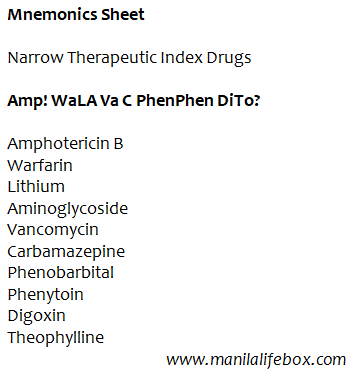Now, let's talk about the anti-arrhythmic heart drugs which might appear as one of the choices in the Physician Licensure Exam (PLE). I will be making this post as short as I can so as to supplement what you have learned in your review with what I can recall during my review.
Take note that this post does not serve to act as your sole source of review information. I might be wrong with some of what I'm saying here, so if you think I have committed mistake, please let me know via the comments section below. There's just so much to learn with so little time.
Antiarrhythmic drugs can be divided into four (4) classes depending on the channel that is being affected:
Singh-Vaughan Williams Classification
Class 1: Sodium (Na) channel blockers
Class 2: Beta blockers
Class 3: Potassium channel blockers
Class 4: Calcium channel blockers
For some mnemonics about the Singh-Vaughan Williams Classification:
I hope it wasn't too much of a headache to try to memorize the mnemonic NaBePoCa.
Remember that arrhythmia could either be due to abnormal automaticity where areas other than the natural pacemaker (SA node) take over in dictate the heart rate or due to abnormal conduction through erratic impulses.
Here are the mnemonics for the different classes of anti-arrhythmic drugs.
Class 1 Antiarrhythmics drugs
Since they're all anti-arrhythmic drugs, we should be reminded that the amount and administration of these if left unchecked can also cause arrhythmias. Notable differentiating side effects of Class 1 anti-arrhythmic drugs are as follows:
Side effects of Class 1A antiarrhythmic drugs:
- Quinidine- - cinchonism (tinnitus, headache, vertigo)
- Procainamide - lupus-like syndrome
- Disopyramide - antimuscarinic effects (decreased salivation and gastric secretions)
Side effects of Class 1B antiarrhythmic drugs: agranulocytosis (Tocainide), CNS stimulation, CVS depression
- MUST-KNOW: Lidocaine is used in digitalis-induced arrhythmias
Side effects of Class 1C antiarrhythmic drugs: increased arrhythmias, CNS stimulation
- MUST-KNOW: Flecainide is contraindicated in post-MI settings
Class 2 Antiarrhythmics drugs

Notable side effects of Class 2 anti-arrhythmic drugs are as follows: cardiac depresssion, bronchospasm, AV block
- MUST-KNOW: Esmolol can be used for SVT and acute perioperative and thyrotoxic arrhythmias
Class 3 Antiarrhythmics drugs
Notable side effects of Class 3 anti-arrhythmic drugs are as follows:
- Sotalol and Dofetilide - Torsade de pointes
- Amiodarone - as mentioned above (note: of all anti-arrhythmic drugs, Amiodarone is the most efficacious0
Class 4 Antiarrhythmics drugs
Side effects of Class 4 antiarrhythmic drugs include: pretibial edema, flushing, constipation, gingival hyperplasia, cardiac depression
Non-DHPs like Diltiazem and Verapamil are useful in SVT migraines too.
Note: Dihydropyridine CCBs like Nifedipine and Amlodipime are not used as antiarrhythmic drugs because these facilitate, not terminate, compensatory sympathetic discharges.
I hope I was able to help you with this topic, kahit kaunti. I apologize if this isn't too deep a dive for your review. Good luck on your PLE!








